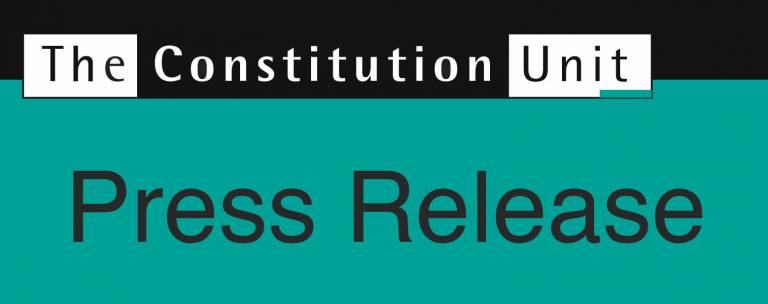Press Release: Don't RushEnglish Votes on English Laws, says Constitution Unit
16 December 2014

Commenting on the publication today of the government's different options for English votes for English laws, the Director of UCL's Constitution Unit Professor Robert Hazell said:
"What this shows is how complicated the whole issue is, and how important it is for it not to be rushed. Cameron must be regretting opening such a Pandora's box, which now risks exposing divisions within the Conservatives' own ranks. Labour want to take things more slowly, but maybe too slowly. They may be optimistic in supposing the whole issue can be solved by referring it to a constitutional convention".
Constitution Unit Deputy Director Professor Meg Russell added:
"There's a real risk that the two main parties use this serious question as a political football in the run-up to the general election, with each defending a position that suits their own electoral interests, and seeking to embarrass the other. But such a key matter about the future of the UK's political system instead deserves cool-headed nonpartisan consideration - involving voices beyond the parties, and citizens themselves. Labour's constitutional convention idea would do this, but not start for months, and be too wide-ranging. The government should open up an inclusive conversation, on an adequate timetable, starting now".
If the plan is to have Commons votes on the different options there is a risk that this could become a shambles like the votes on the options for Lords reform in 2003, which ended with all seven options being rejected. Not only would the votes expose splits between the coalition partners, but they could also expose splits among the Conservatives, between the gradualists and the hard liners: between those who want to allow English votes at earlier stages of English laws, which can later be overruled by the House as a whole, and those who want an English veto at every stage.
"The hard liners who want a complete English veto are playing with fire" said Professor Hazell. "Given the complexities, this cries out for a gradualist approach. All four commissions which have looked at this have recommended a soft version of EVEL: allowing a greater English voice, but not an English veto. A softer version also reduces the risk to the Speaker, who will have to rule on what is and what is not an English law. The technical difficulties and the political risks all point towards taking this gently, and initially trying EVEL out on an experimental basis".
Notes for Editors
- The Constitution Unit is an independent and non-partisan research centre based in the Department of Political Science at University College London.
- The Constitution Unit produced a book on The English Question, edited by Prof Hazell, in 2006.
- The four bodies which have considered English votes on English laws are the Commons Procedure Committee (1999), Lord Norton's Conservative Commission on Strengthening Parliament (2000), Ken Clarke's Conservative Democracy Task Force (2008) and the McKay Commission (2013).
- Both Professor Hazell and Professor Russell are available for interview. Tel 020 7679 4977 or email constitution@ucl.ac.uk
 Close
Close


